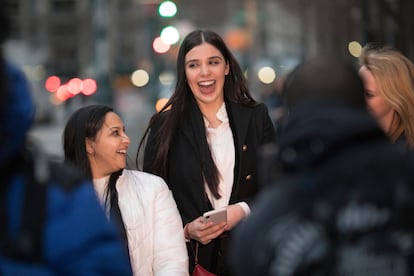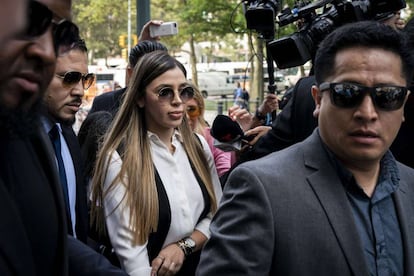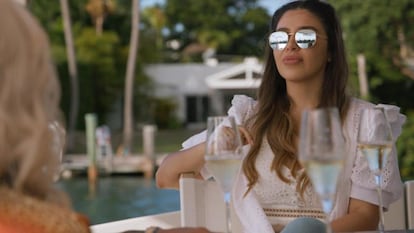Emma Coronel: How the ‘Kardashian of Sinaloa’ went from influencer to prisoner
The wife of Mexican cartel boss Joaquín “El Chapo” Guzmán was known for years as a social media icon, model and businesswoman. But her life of luxury has come crashing down and now she spends 22 hours alone in a cell as she awaits trial for drug charges

Stripped of her jewelry, luxury clothes and Louis Vuitton heels, Emma Coronel was unrecognizable as she appeared in a blue and green prison jumpsuit at a virtual court hearing in the United States. Coronel, the third wife of Mexican drug trafficker Joaquín “El Chapo” Guzmán Loera was denied bail by a judge after being charged last February with international trafficking of cocaine, methamphetamine, heroin and marijuana. Known as the “Kardashian of Sinaloa,” Coronel also stands accused of helping her husband escape from prison in 2015 in a madcap jailbreak that involved a mile-long tunnel dug from his shower.
If convicted of all charges, she faces a maximum sentence of life in prison and a fine of $10 million (€8.25 million), as well as the prospective humiliation of losing a life spent in a blur of yachts, luxury brands and photo shoots. Coronel now spends 22 hours a day in a prison cell in Alexandria in the state of Virginia, in conditions denounced by her lawyer Mariel Colón. “She only spends a couple of hours in a small communal room,” Colon said. Alone in her cell, Coronel devotes herself to reading, as “they don’t offer her anything else to do to distract herself,” according to Colón. It is unknown if Coronel is able to speak with her twin daughters from her marriage to El Chapo, the leader of the Sinaloa cartel and the world’s most notorious drug lord.
Coronel was a familiar face at the 2019 New York trial of her husband, who was eventually sentenced to life in prison. Flanked by bodyguards, the impeccably dressed, the dutiful wife and her children quickly attracted the attention of the press pack. She said at the time she was fine despite the pressure of the trial, and confirmed she had never hidden the whereabouts of El Chapo from the twins. “They know their dad is in jail,” she told the press. “They pull me away from feeling lonely, they keep me busy,” she said. Her defense of her husband has never wavered.

Coronel is a US and Mexican citizen by virtue of her birth on American soil on July 2, 1989. She is allegedly the niece of Ignacio Coronel, an infamous trafficker of methamphetamines to the United States. Her father Inés Coronel Barreras and the man she denies is her uncle were involved in drug trafficking in the early 1990s, when El Chapo controlled the market for cocaine within Mexico. Ignacio was killed on July 29, 2010, in Zapopan, Jalisco state, during a shootout with the Mexican army. Inés Coronel Barreras has several convictions for marijuana trafficking, as does Emma’s brother, Inés Omar Coronel, who is also serving time for drug offenses.
As a child, Emma Coronel shuttled between the US and a remote town near Angostura, in Mexico’s Durango state, at the center of what is known as the country’s “Golden Triangle” for drug trafficking. She began participating in beauty pageants at a young age, and at age 17 was named beauty queen at the Coffee and Guava Festival. At a ball to celebrate her coronation, she met her future husband – El Chapo, who was 51 at the time. Coronel left her boyfriend to become El Chapo’s third wife, and they agreed to marry the day she legally became an adult, just a few months after they met.
With her elaborate make-up and calm demeanor, Coronel has given several television interviews where she has revealed details of her private life with carefully chosen words. El Chapo, she revealed, made her fall in love with his words rather than expensive gifts. “He won me over with kindness, and with his manners,” she said. Her husband urged her to continue her education, and she began a degree in communication sciences at the Autonomous University of Sinaloa. She would have liked to be a journalist, she once said.
Coronel has always looked at ease in front of the camera, and easily dodged awkward questions about her husband’s business dealings with a smile. “I would prefer not to answer that,” she would respond in a shy voice whenever anything related to drug trafficking entered the conversation. Although she emphasized she lived a normal life, going out with her friends to restaurants and the movies, in Sinaloa everyone knew who she was. “I don’t need lots of material things, just happiness and calm. I don’t want them to make a big deal about my life. I like to go to the beach, go out and have fun like anyone else,” she told the press.
Coronel had twin daughters with Guzmán in 2011, named María Joaquina and Emalí Guadalupe. They were also born in the US, and the girls are half-sisters to the eight other children El Chapo has from previous marriages. Although Coronel has said she does not know exactly how many children Guzman has fathered, she is helping to raise three of them.
The fortune El Chapo amassed from cocaine in the 1990s afforded him a life of luxury: four private planes, mansions scattered along Mexico’s best beaches and even a zoo on one of his many ranches. Miguel Angel Martínez, El Chapo’s right-hand man and known among Sinaloa cartel members as “El Gordo,” spilled the beans on the family’s flashy lifestyle at his trial. The ranch they owned in Guadalajara boasted four swimming pools and a menagerie of exotic pets such as tigers, lions, panthers and deer, he said. “Guests would ride around on a little train,” El Gordo recounted, before describing his business partner’s dozens of luxury cars and frequent trips abroad.
Emma Coronel lived through the glory years of her husband’s power by looking the other way. “I am not aware that he deals drugs. I’m in love with him,” she has insisted. While he awaited sentencing, she said she lived off her own businesses. “I can’t tell you much about them, only that they are not illicit. For example, I own land that I inherited from my dad,” she said in 2018. US prosecutors have said that Coronel not only knew about the Sinaloa Cartel’s operations, but also took part in some of them. With El Chapo in jail, his wife took on an important role in communicating with her husband’s associates, according to court documents. Among the evidence that FBI agent Eric S. McGuire included while obtaining the warrant for her arrest is a letter allegedly written by El Chapo to an associate regarding heroin trafficking. “The mother of the twins will tell you and my sons something. Please be attentive compadre. She will explain,” the document read.
On February 22, 2014, Mexican commandos arrested El Chapo in Mazatlan, Sinaloa. He was then the second most wanted cartel boss in Mexico and managed to outwit the authorities in order to see Emma Coronel and their two daughters. That romantic gesture earned him a place at El Altiplano, a Mexican maximum-security prison. He remained there for a year until he enacted one of the most brazen prison escapes the world has ever seen. In July 2015, El Chapo climbed through a 1,500-meter tunnel dug from an entrance in the shower block, which had features including lighting, ventilation and even rails to help to remove debris. The Washington DC District Court accuses Coronel of helping her husband during this stranger-than-fiction escapade.
The former model sat alone during El Chapo’s trial, watching her husband wearing the ties she had bought for him. She barely reacted when FBI agents read the transcript of messages between Guzman and one of his mistresses, Agustina Cabanillas Acosta. The exchange not only showed Guzman’s infidelity, it also exposed the mistress’s involvement in cocaine and marijuana trafficking in the United States. The mistress called him “love,” and said he was “the most important person to her.” The agent who led the investigation said that Acosta “became his plaything” and that Guzman “liked her a lot.” El Chapo looked over at Coronel as his infidelity was exposed.

Once his sentence was handed down, Coronel took advantage of the media hype surrounding her and participated in a reality show called Cartel Crew on the US cable network VH1. “I try not to regret what’s in the past,” Coronel said on camera in a conversation with Michel Blanco, son of Colombian drug trafficker Griselda Blanco. The wife of the world’s most famous drug lord insisted on the show that she wanted to be a normal woman. “They judge us without knowing us. It’s hard because sometimes you just want to do what you see everyone around you doing,” she said, dressed in white while standing on a yacht. She asked Blanco for advice on how to launch a clothing brand called “El Chapo Guzmán: JGL” (the acronym is for her husband’s full name). One of Chapo’s daughters, Alejandrina Guzmán, launched her own brand in 2019 called El Chapo 701, in reference to a Forbes magazine listing that ranked the drug trafficker as the 701st richest person in the world in 2009. Neither company managed to stay in business.
In a very millennial move, Emma Coronel diversified her business and invested heavily in becoming an influencer through her Instagram account. She promoted several local brands in Sinaloa, including beauty products, clothing, jewelry, even burger joints and ice cream parlors in the area. There are only five posts on the account, but it has accumulated 592 million followers. El Chapo’s wife does not focus on her private life, but instead deploys professional photographs where her followers praise her image and style. The last post, published two months before her arrest, shows her posing in a wedding dress with long blonde hair. Then the bubble burst, and now the world is waiting to see just how long the influencer will have to keep wearing that prison jumpsuit.
Tu suscripción se está usando en otro dispositivo
¿Quieres añadir otro usuario a tu suscripción?
Si continúas leyendo en este dispositivo, no se podrá leer en el otro.
FlechaTu suscripción se está usando en otro dispositivo y solo puedes acceder a EL PAÍS desde un dispositivo a la vez.
Si quieres compartir tu cuenta, cambia tu suscripción a la modalidad Premium, así podrás añadir otro usuario. Cada uno accederá con su propia cuenta de email, lo que os permitirá personalizar vuestra experiencia en EL PAÍS.
¿Tienes una suscripción de empresa? Accede aquí para contratar más cuentas.
En el caso de no saber quién está usando tu cuenta, te recomendamos cambiar tu contraseña aquí.
Si decides continuar compartiendo tu cuenta, este mensaje se mostrará en tu dispositivo y en el de la otra persona que está usando tu cuenta de forma indefinida, afectando a tu experiencia de lectura. Puedes consultar aquí los términos y condiciones de la suscripción digital.









































